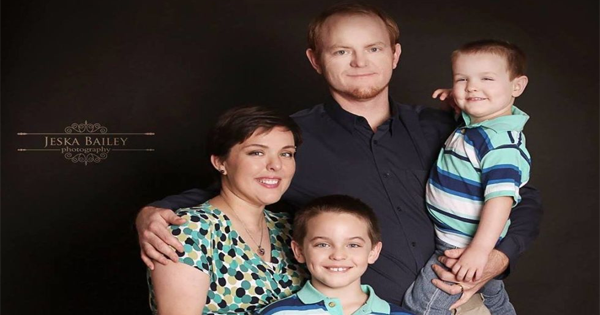Advertisement
On March 14, 2014, Jenny Cooper discovered a massive lump in her breast. It was 3 am, so she didn't want to wake her husband, Chris, to ask him to confirm, but she knew there was no other explanation for it. Many women in her family suffered from breast or ovarian cancer, so she knew her chances of developing one or the other was high.
She simply didn't expect it to happen when she was 31, when her sons were still just two and six years old.
Cooper brought herself to the doctor as soon as possible, and her suspicions were confirmed. She had breast cancer, and it had already spread to her lymph nodes.
She and her husband had to break the news to their sons, using Cooper's mother and her successful battle with breast cancer as a reference point. At that point, Cooper had still been hopeful that she could defeat the disease and went to every doctor's appointment, blood test, scan, and treatment with optimism.
For several months, the treatments seemed to be working in keeping the tumors from progressing, and even helping some of them retreat.
But in May 2015, Cooper's doctor told her that the cancer had returned. Now, it was stage 4 and terminal. Cooper had no idea how long she had left to live, but even then, her first thought was of her sons.
"I was clear with them and explained that I am going to die from this," she explained. "They're so young, but I needed them to know the truth. What if they come home from school and I'm dead? Or, heaven forbid, I'm home alone with them when it happens."
In August 2015, Cooper's diaphragm seized, and for almost 15 minutes, she could barely breathe. Her husband had been massaging her at the time and could do nothing but stay by his wife's side, offering his presence and support. When the incident was over, she told him, "If that happens again and I stop breathing, just let me go. Just hold me and love me and tell me that it's okay and let me go."
A year later, in August 2016, Cooper was moved to hospice care and a month after that, she and her doctors decided to end treatment because it was causing her more pain than it was helping with her condition.
For Cooper, even as she struggles with her pain, "it breaks [her] heart for [her] family to have to go through this and to see [her] in agony." She recalls, "The other day, I shouted out in pain from a spasm and Devin, terrified, asked, 'Mom, are you dying now?'"
Cooper has shared her entire journey and story on Facebook and YouTube in hopes that her and her family's struggle will allow more people to understand why death with dignity laws are so important.
"I think it should be up to me and my family when I end this battle. I just don't want them to be scared anymore. I'm out of treatment options, so all I'm doing at this point is growing cancer and waiting for death. Why would anyone force this on another person? Giving the terminally ill the choice should be a basic human right," Cooper explained.
Our hearts and prayers go out to the Cooper family during this time.




